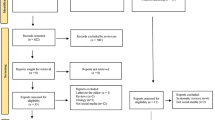Abstract
This commentary discusses the use of social media in psychiatric graduate medical education (GME) based on a systematic search of the literature. The authors conclude that research on social media use in psychiatric GME is in its infancy. For the most part, the few articles that have been published on this topic caution against the use of social media in psychiatric training. However, reports from other specialties, in which social media use in medical education has been more extensively studied, suggest that there may be significant benefits to incorporating social media into medical education. Although additional challenges may exist in implementing these tools in psychiatric education, the authors suggest that this is an emerging field of scholarship that merits further investigation.

Similar content being viewed by others
References
Facebook Newsroom. Retrieved April 30th 2014 from: http://newsroom.fb.com/company-info/.
About Twitter. Retrieved April 30th 2014 from: https://about.twitter.com/company.
MacDonald J, Sohn S, Ellis P. Privacy, professionalism and Facebook: a dilemma for young doctors. Med Educ. 2010;44(8):805–13.
McGowan BS, Wasko M, Vartabedian BS, Miller RS, Freiherr DD, Abdolrasulnia M. Understanding the factors that influence the adoption and meaningful use of social media by physicians to share medical information. J Med Inter Res. 2012;14(5):e117.
von Muhlen M, Ohno-Machado L. Reviewing social media use by clinicians. J Am Med Inform Assoc. 2012;19(5):777–81.
Frankish K, Ryan C, Harris A. Psychiatry and online social media: potential, pitfalls and ethical guidelines for psychiatrists and trainees. Australas Psychiatry. 2012;20:181–7.
Cheston CC, Flickinger TE, Chisolm MS. Social media use in medical education: a systematic review. Acad Med. 2013;88:893–901.
McGee JB, Begg M. What medical educators need to know about “Web 2.0”. Med Teach. 2008;30(2):164–9.
Varga-Atkins T, Dangerfield P, Brigden D. Developing professionalism through the use of wikis: a study with first-year undergraduate medical students. Med Teach. 2010;32(10):824–9.
Potts HWW. Student experiences of creating and sharing material in online learning. Med Teach. 2011;33(11):E607–14.
Cadogan M, Thoma B, Chan TM, Lin M. Free Open Access Meducation (FOAM): the rise of emergency medicine and critical care blogs and podcasts (2002–2013). Emergency Medicine Journal 2014 February 19.
Spiegel R, Johnston M, Ercleve T, Nickson CP. Dispatches from the free open access meducation frontier. Emerg Med Australasia: EMA. 2014;26(2):100–3.
Thoma B, Joshi N, Trueger NS, Chan TM, Lin M. Five strategies to effectively use online resources in emergency medicine. Ann Emerg Med. 2014;64(4):392–5.
Gabbard GO, Kassaw KA, Perez-Garcia G. Professional boundaries in the era of the internet. Acad Psychiatry. 2011;35:168–74.
Mossman D, Farrell HM. Facebook: social networking meets professional duty. Current Psychiatry. 2012;11:34–7.
Cheston CC, Flickinger TE, Chisolm MS. Social media use in medical education: a systematic review. Acad Med. 2013;88(6):893–901.
Cain J, Chretien KC. Exploring social media’s potential in interprofessional education. Journal of Research in Interprofessional Practice and Education 2013;3(2).
Hollinderbaumer A, Hartz T, Uckert F. Education 2.0—how has social media and Web 2.0 been integrated into medical education? A systematical literature review. GMS Z Med Ausbild. 2013;30:Doc14.
Baer W, Schwartz AC. Teaching professionalism in the digital age on the psychiatric consultation-liaison service. Psychosomatics. 2011;52:303–9.
Ginory A, Sabatier LM, Eth S. Addressing therapeutic boundaries in social networking. Psychiatry. 2012;75:40–8.
Koh S, Cattell GM, Cochran DM, Krasner A, Langheim FJ, Sasso DA. Psychiatrists’ use of electronic communication and social media and a proposed framework for future guidelines. J Psychiatr Pract. 2013;19:254–63.
DeCamp M, Koenig TW, Chisolm MS. Social media and physicians’ online identity crisis. JAMA. 2013;310(6):581–2.
American Medical Association. AMA policy: professionalism in the use of social media. Chicago: Am Med Assoc; 2011.
Chretien KC, Yarris LM, Lin M. Technology in graduate medical education: shifting the paradigm and advancing the field. J Grad Med Ed. 2014;6(2):195–6.
Dinh M, Tan T, Bein K, Hayman J, Wong YK, Dinh D. Emergency department knowledge management in the age of Web 2.0: evaluation of a new concept. Emerg Med Australasia. 2011;23(1):46–53.
Thoma B, Chan T, Desouza N, Lin M. Implementing peer review at an emergency medicine blog: bridging the gap between educators and clinical experts. Cjem. 2014;16(0):1–4.
Matava CT, Rosen D, Siu E, Bould DM. eLearning among Canadian anesthesia residents: a survey of podcast use and content needs. BMC Med Ed. 2013;13:59.
Narula N, Ahmed L, Rudkowski J. An evaluation of the ‘5 Minute Medicine’ video podcast series compared to conventional medical resources for the internal medicine clerkship. Med Teach. 2012;34(11):e751–5.
Sparks MA, O’Seaghdha CM, Sethi SK, Jhaveri KD. Embracing the Internet as a means of enhancing medical education in nephrology. Am J Kidney Dis. 2011;58(4):512–8.
Disclosure
On behalf of all authors, the corresponding author states that there is no conflict of interest.
Author information
Authors and Affiliations
Corresponding author
Rights and permissions
About this article
Cite this article
O’Hagan, T.S., Roy, D., Anton, B. et al. Social Media Use in Psychiatric Graduate Medical Education: Where We Are and the Places We Could Go. Acad Psychiatry 40, 131–135 (2016). https://doi.org/10.1007/s40596-015-0372-3
Received:
Accepted:
Published:
Issue Date:
DOI: https://doi.org/10.1007/s40596-015-0372-3




